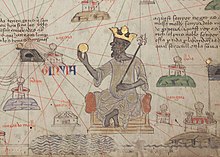Portal:The Gambia
The Gambia Portal  The Gambia, officially the Republic of the Gambia, is a country in West Africa. Geographically, The Gambia is the smallest country in continental Africa; it is surrounded by Senegal, except for its western coast on the Atlantic Ocean. It is situated on both sides of the lower reaches of the Gambia River, which flows through the centre of the country and empties into the Atlantic Ocean. The national namesake river demarcates the elongated shape of the country, which has an area of 11,300 square kilometres (4,400 sq mi) and a population of 2,468,569 people in 2024. The capital city is Banjul, which has the most extensive metropolitan area in the country; the second- and third-largest cities are Serekunda and Brikama. Arab Muslim merchants traded with native West Africans in The Gambia throughout the 9th and 10th centuries. In 1455, the Portuguese were the first Europeans to enter The Gambia, although they never established significant trade there. The region was made a part of the British Empire by establishment of a colony in 1765, and exactly 200 years later, in 1965, The Gambia gained independence under the leadership of Dawda Jawara. Jawara ruled until Yahya Jammeh seized power in a bloodless 1994 coup, with Jammeh ruling until 2017. Adama Barrow became The Gambia's third president in January 2017, after defeating Jammeh in the December 2016 elections. Jammeh initially accepted the results, but then refused to leave office, triggering a constitutional crisis and military intervention by the Economic Community of West African States that resulted in his removal two days after his term was initially scheduled to end. The Gambia has been a member of the Economic Community of West African States since its conception in 1975 and is a member of the Commonwealth, with English being the country's sole official language, both legacies of its British colonial past. The Gambia's economy is dominated by farming, fishing, and especially tourism. In 2015, 48.6% of the population lived in poverty. In rural areas, poverty was even more widespread, at almost 70%. (Full article...) Selected article -The Mandinka or Malinke are a West African ethnic group primarily found in southern Mali, the Gambia, southern Senegal and eastern Guinea. Numbering about 11 million, they are the largest subgroup of the Mandé peoples and one of the largest ethnic-linguistic groups in Africa. They speak the Manding languages in the Mande language family, which are a lingua franca in much of West Africa. Virtually all of Mandinka people are adherent to Islam, mostly based on the Maliki jurisprudence. They are predominantly subsistence farmers and live in rural villages. Their largest urban center is Bamako, the capital of Mali. The Mandinka are the descendants of the Mali Empire, which rose to power in the 13th century under the rule of king Sundiata Keita, who founded an empire that would go on to span a large part of West Africa. They migrated west from the Niger River in search of better agricultural lands and more opportunities for conquest. Nowadays, the Mandinka inhabit the West Sudanian savanna region extending from The Gambia and the Casamance region in Senegal, Mali, Guinea and Guinea Bissau. Although widespread, the Mandinka constitute the largest ethnic group only in the countries of Mali, Guinea and The Gambia. Most Mandinka live in family-related compounds in traditional rural villages. Their traditional society has featured socially stratified castes. Mandinka communities have been fairly autonomous and self-ruled, being led by a chief and group of elders. Mandinka has been an oral society, where mythologies, history and knowledge are verbally transmitted from one generation to the next. Their music and literary traditions are preserved by a caste of griots, known locally as jelis, as well as guilds and brotherhoods like the donso (hunters). (Full article...)Selected image -Did you know -
This is a Good article, an article that meets a core set of high editorial standards.
The Gambia, officially the Republic of the Gambia, competed at the 2016 Summer Olympics in Rio de Janeiro, which was held from 5 to 21 August 2016. The country's participation at Rio marked its ninth appearance at the Summer Olympic Games since its début at the 1984 Summer Olympics. The delegation included two track and field athletes, Adama Jammeh and Gina Bass, who both qualified after meeting the qualification standards for their respective events, one judoka, Faye Njie, who made the Games through a quota place and one swimmer, Pap Jonga, who earned a universality place to enter the Games. The Gambia made their début appearances in the judo and swimming events. Bass was selected as the flag bearer for the opening and closing ceremonies. All four athletes were eliminated from the first rounds of their events. (Full article...) SubcategoriesRelated portalsWikiProjects
Selected panorama -TopicsAssociated WikimediaThe following Wikimedia Foundation sister projects provide more on this subject:
Discover Wikipedia using portals |





































